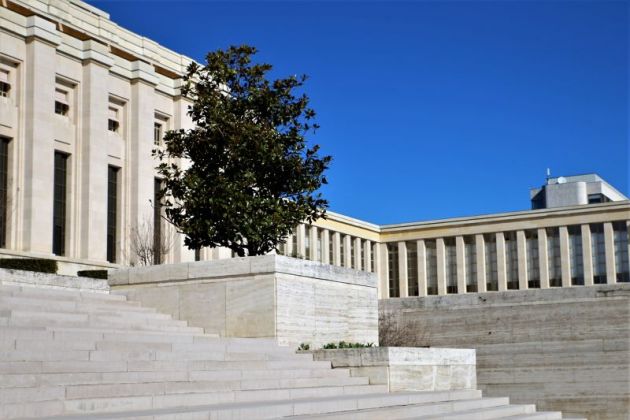Nigerians spotlight children in UN review after seeking world churches help

Three members of Nigeria's Christian community have spotlighted the challenges that children, and particularly girls, face in their society, showing how churches and the United Nations system can interact to make the lives of young females better.
Their meetings took place ahead of the November Universal Periodic Review of their country, at the United Nations in Geneva.
Every few years the UPR looks at the human rights records of every country in a process which takes place at the UN in Geneva.
The current session of the UPR from November 5 – 16 involves Nigeria as one nation having its record reviewed.
Others under review in the current UPR session are: Belize, Central African Republic, Chad, China, Republic of Congo, Jordan, Malaysia, Malta, Mauritius, Mexico, Monaco, Nigeria, Saudi Arabia and Senegal.
Nigeria has a population of some 203 million people, with about half said to be Chrisitians and the other half Muslims, Alfrican tradtional relgions are also followed by Muslims and Christians.
One of the youngest contributors was Peace, a 15-year-old Nigerian student, who said that when she had to go before the nations of the world, and a representative from her government was there, "At first, I was scared."
PEACE CHOSEN BY PEERS
Peace said she was chosen by peers last year at a World Council of Churches workshop in Nigeria to speak to the UPR.
The WCC represents more than 550 million Christians from mainly, Anglican, Orthodox and Protestant traditions. It is based in Geneva and cooperates with a number of UN agencies, including UNICEF, the UN children's agency.
"Nigeria is the first time we have consulted children for such a process, but we hope to do this more in the future," said Jennifer Philpot-Nissen, WCC program executive for Human Rights and Disarmament.
"We were approached in 2017 by the Methodist Church Nigeria with concerns about violations of the rights of the child in their country, particularly with respect to violence and sexual abuse of children," she said.
During an interview Peace said, "The first problem I presented was the implementation of the Child Rights Act because in Nigeria only 24 states (out of 36) have adopted it." She also said that even those states that have adopted the law "not fully implemented it".
Peace said it is important for children to speak before an international mechanism like the UPR because "children know what is happening. So, if politicians listen, then they will know what is needed to move the country forward."
The UPR is special because it allows some paricipation by civiil society along with the State actors.
The UN says that civil society actors, such as national human rights institutions, known as NHRIs and regional mechanisms can submit written information, which is considered during the review.
So, the UPR process provides for the participation of all relevant stakeholders, including non-governmental organizations, NHRIs and regional mechanisms.
PEACE CHOSEN BY PEERS
Civil society actors, NHRIs and regional mechanisms can submit written information for the report containing a summary of information submitted by other stakeholders, which is considered during the review.
The UPR complements the work of other human rights mechanisms, including the UN human rights treaty bodies. But it can be used to highlight whether countries are adhering to treaties they have signed.
The UN says that civil society actors, such as national human rights institutions, known as NHRIs and regional mechanisms can submit written information, which is considered during the review.
Accredited stakeholders can also attend and make oral statements, during the regular sessions of the Human Rights Council when the outcomes of the State reviews are considered.
Rev. Kolade Fadahunsi, director of Institute of Church and Society for the Council of Churches in Nigeria said, "In the pre-session looking at the human rights record in Nigeria, the WCC has been pivotal for us in bringing our voice to the UPR session."
LOOKING AT THE LAST REVIEW
The session has looked at the recommendations for Nigeria in its 2013 review and "how we have done" enabling those making submissions to the reach diplomatic missions taking part in the UPR.
"The World Council of Churches has remained an institute that helped us build our capacity and partner us with our public witness activity in Nigeria," said Fadahunsi.
He spoke of the challenges for Nigerian children in getting access to education and in how they are treated by adults.
Children in Nigeria face high education fees and for "girl children education is still a big challenge in some parts of Nigeria because of religious and traditional beliefs" that can have children forced into early marriage and due to having "to remain silent they can be second-class citizens in the family."
"We as the church are trying to say all human beings are born equal and sexism should not be what is determining what a particular child should achieve as a member of a family," said Fadahunsi.
Rev. Juliet Eneh of the Methodist Church Nigeria spoke about violence and sexual abuse that children face in Nigeria at home and in education, and in trafficking for those who do not make it to school which can drag them thousands of kilometers away.
"Churches are trying their best, but a culture of silence is affecting the church. I appreciate the efforts of the WCC to allow children's voices to be heard. When children complain they often don't have someone to speak to," she said.
Eneh said that when she had to speak to the UPR she was initially afraid of what might happen to her for speaking.
But she realized, "We are talking to the world, not just to governments. So that when the world hears, and God will hear us, great things will be achieved. I am comfortable speaking to this environment."
